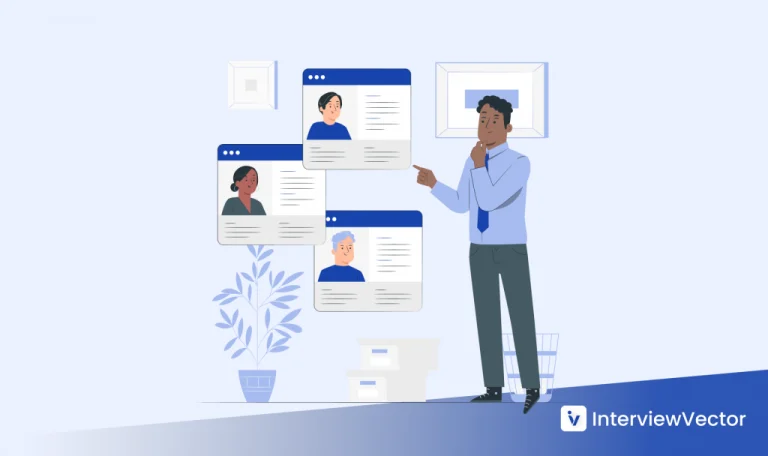IIn today’s job market, technical evaluation plays a role, for organizations striving to assemble exceptional technical teams. Whether you’re a Hiring Manager, HR Expert, or TA Specialist, understanding the technical screening interview process is critical to identifying to prospects and avoiding poor recruiting decisions. In this write-up, we will delve into the numerous technical screening tactics, in addition to setting proper job criteria and emphasizing successful candidate onboarding methods.
What is Technical Screening?
Technical screening, in the field of IT, involves evaluating candidates to determine their abilities. These tech screenings serve as a path to assessing which candidates, from the technical talent pool, meet the job description and requirement criteria more appropriately than others.
During such tech-based screening interviews, candidates often react and try to answer quickly to show off their expertise in the area and to demonstrate their problem-solving talents and coding skills. The primary purpose of these tech screening interviews is to identify which group of individuals has the right knowledge and which ones lack the required competencies, leading the whole screening process to be streamlined better for further stages of the tech hiring process. The candidates who do not pass these screening tests are immediately rejected, but at times, some of these candidates who show promising potential are put on a waitlist for future job prospects.
Why is Technical Screening Important?
Technical screening interview skills play a role in the hiring process for various reasons. In tech screening interviews, HR managers, talent acquisition professionals, and recruitment specialists can effectively assess a candidate’s capabilities and expertise. By using assessment techniques to judge skills, companies can ensure that candidates meet the required qualifications for the job. Screening interviews help save time and resources by identifying individuals who may lack skills or problem-solving abilities. Moreover, this method reduces the likelihood of hiring candidates, thus minimizing the need to replace employees who do not advance through the interview rounds.
What is a Technical Screening Interview?
Technical screening interviews play a role, in evaluating candidates’ technical expertise and problem-solving capabilities. These interviews offer the opportunity to gauge how well a candidate can handle challenges and collaborate with team members in time. Utilize pair programming tasks, code evaluations, and system design discussions to assess the candidate’s proficiency.
When conducting screening interviews, it is essential to present candidates with scenarios and obstacles relevant to the position. This approach helps evaluate their thinking skills, problem-solving abilities, and teamwork aptitude. Offering feedback and support throughout the interview process enables candidates to showcase their competencies and potential for success, in the given role.
What are the Characteristics of a Technical Screening Interview?
There are 4 basic characteristics of a technical screening interview:
- Technical Skills Screening
- Candidates are posed with specific questions regarding the IT field.
- The interviewer screens the candidate’s problem-solving skills, coding proficiency, and domain expertise.
- Structured Approach
- The candidates are approached with a mix of technical and non-technical questions.
- The tech screening questions are crafted to evaluate competencies vital for the position, ensuring uniform assessment and equitable comparison among candidates.
- Practical Tasks & Coding Challenges
- Candidates are presented with real-life coding challenges that come up daily during projects, and also some that are on an advanced level.
- These recruitment tests provide insight into how the candidates view the problems and prioritize solving them in stages.
- Narrowing down Eligible Candidates
- Candidates who are unsuccessful in clearing the technical screening interviews might not make it to the next stages of the hiring process.
- This stage makes sure that only the candidates who fit the job description and requirements follow through to the hiring managers.
Why do Companies need Technical Screening?
Technical screening plays a role in the hiring process for companies that are looking to fill technical positions. Here’s why:
- Assessing Technical Skills
- During a tech screening interview, the main goal is to evaluate a candidate’s abilities and expertise.
- This interview, typically led by HR professionals, recruitment specialists, or experienced hiring individuals, aims to confirm that candidates fulfill the requirements for a position.
- Screening for Unqualified Candidates
- Identifying candidates who do not possess the required skills through technical screening is crucial.
- Those who do not pass this interview may not move forward in the hiring process, ultimately saving time and resources for the company.
- Mitigation of Hiring Risks
- During the tech screening interview, companies evaluate the candidates’ technical skills and problem-solving abilities to ensure they hire individuals best suited for the role.
- This helps in selecting candidates with expertise, leading to lower turnover rates and reduced recruitment costs.
- Cost & Time Efficiency
- Technical screening contributes to saving both time and resources for companies. To enhance the effectiveness of the hiring process, companies can save time and resources by filtering out candidates.
- By establishing proper and strict screening criteria and conducting tech screen interviews, companies can streamline their hiring procedures and identify top candidates more effectively.
Tips & Strategies for Conducting a Successful Technical Screening
- Tips for a successful tech screening:
- Updated Technical Knowledge – Candidates should make sure to refresh their understanding of the responsibilities regarding the job position. Keep abreast of pertinent industry trends, in the technical evaluation process. Emphasize the significance of being knowledgeable in programming languages, databases, frameworks, and other technologies outlined in the job posting.
- Practical Coding Challenges – Encourage individuals to engage in challenges by suggesting they practice coding problems to improve their problem-solving skills. Platforms such as LeetCode or HackerRank offer a variety of problems related to programming languages and technologies which can help boost their confidence and preparedness for interviews.
- Candidates with Project Portfolios – Request candidates to compile a portfolio showcasing their projects to demonstrate their proficiency. Encourage them to highlight their achievements, roles played, and technologies utilized. This will provide insight into their capabilities and experience with projects.
- Review the Job Description – Before heading into the screening interview, ensure that you grasp the job requirements. Evaluate whether the candidate’s skills align with what’s required for the role by identifying the skills, programming languages, and technologies specified in the job description.
- Data Structures & Algorithms – Assessing candidates’ understanding of data structures and algorithms commonly tested in interviews is crucial. It involves reviewing their knowledge of data structures such as arrays linked lists, stacks, queues, trees, and graphs & key algorithms, like sorting, searching, and dynamic programming.
2. Strategies for Successful Tech Screening Interview
- Encourage Candidates to Clarify all Information– Make sure to prompt candidates to ask any questions that can help them understand the problem or scenario better during the screening interview. They must know that seeking clarification is encouraged if any part of the problem appears unclear or ambiguous.
- Observe the Candidates’ Thought Process – When interacting with candidates, it’s beneficial to have them explain their problem-solving approach. Request that they narrate the steps they are following the choices they are making, and the logic driving those choices. This allows you to understand how they tackle problems and assess their problem-solving skills effectively.
- Evaluate Candidate’s Problem-Solving Approach – Assess how candidates break down problems into manageable parts. Evaluate their skill in identifying components of a problem and dividing it into subproblems. Look for candidates who can tackle each subproblem independently and then integrate their solutions cohesively into the issue.
- Check Candidate’s Code Testing Practices – Evaluate how candidates approach testing their code by requesting them to test it with test cases. Seek out individuals who test their code using both scenarios and edge cases to ensure accuracy and catch any bugs or mistakes. Job applicants who rigorously test their code will have an advantage in identifying and resolving problems during the interview process.
- Assessing Candidates’ Communication Skills – When evaluating candidates, it’s important to gauge their proficiency in conveying information. This can be achieved by requesting them to articulate their solutions, algorithms, and thinking process. Seek out individuals who can present their approach concisely, emphasizing the concepts and steps involved. Evaluate how well they respond to inquiries and provide insights when needed. Strong communication skills are crucial, for showcasing expertise and problem-solving capabilities during interviews.
Technical Screening Formats: Pros, Cons & When to Use Each
The right type of technical skills screening format can make or break hiring decisions. Not every position or candidate profile requires the same treatment or candidate experience. Here are the most common formats and when to use them:
Live Coding Interviews
Live coding entails candidates working on problems in real-time on a shared IDE platform. The interview observes not just the solution, but the whole thought process, debugging styles, and communication times of a candidate in detail.
- Pros: You can use this for mid-senior engineer, DevOps, or team lead positions and help assess real-time collaboration skills that are put to the test.
- It also helps to review that there’s visibility into how candidates approach of solve problems and technical skills.
- Cons: Candidates can be thrown off by this format.
- It punishes candidates who need to take more time to deliberate and think deeply.
- Interviewers must be well prepared, and the tasks well structured.
Take-Home Assignments
This method entails giving candidates a real-working coding project they will complete in a flexible timeframe, assessing actual work style and thinking depth. You can use this for Frontend/backend/full-stack engineer, mainly in junior or product-centric positions.
- Pros: Candidates can work comfortably while being assessed in their environment.
- It gives an idea of their coding cleanliness, design, and documentation skills.
- It is an obvious simulation of actual job conditions.
- Cons: The process itself may be stretched, thereby delaying the next set of interviews and any general hiring decisions.
- It is difficult to verify if the candidate wrote the code themselves, or did receive help from someone else.
- It may be time-consuming to check the code if there are no scoring criteria available.
Multiple Choice or Automated Online Assessments
MCQ-based testing or automated testing schemes got the right filters for a huge pool of applicants. These tests can be administered and scored very fast.
Use this for: Filtering in the early stages, college hiring, or internship programs.
- Pros: Easy to scale to hundreds of candidates
- You can set a benchmark for your score
- Candidates get it integrated with their ATSs.
- Cons: Very shallow signal that doesn’t include real-world challenges.
- It won’t check collaboration or creativity.
Candidates can game or guess answers.
Hybrid Format
The world is becoming accustomed to combining the formats to get the most dynamic talent, e.g., a take-home assignment which is then followed by a live review. This is often used for product companies for cross-functional or senior role hiring.
- Pros: The best of both worlds, offering detail with discussion
- Lower stress level versus cold live code
- Lower the number of false negatives
- Cons: Multiple rounds can become taxing and time-consuming
Step-by-Step Technical Hiring Funnel
Conducting technical screening interview hiring can be tricky, and one needs to optimize their hiring funnel to get the best talent. Based on the best structured hiring practices, here is what a tech screen interview process should ideally look like:
1. Resume & Profile Screening
Often, the first filter in screening, profiling is all about making the first impression. Look for relevant experience, impact-driven project descriptions, GitHub activity, open-source contributions, and career progression. Keyword matches alone don’t cut it; look for signs of problem-solving and growth.
2. Initial Phone Screen
A 20- to 30-minute call confirms role fit and checks soft skills, focusing on:
- Candidate motivation
- Transitions between roles in the past
- Clarity in communication
- Alignment with salary and notice period
- Move into the technical skills screening
3. Online Technical Assessment
This comes in the form of MCQ tests or automated algorithms via platforms such as Interviewvector, HackerRank, CodeSignal, or Coderbyte. Questions should emphasize the job role more than a text-guide on Computer Science knowledge.
4. Live Coding Interview
Have candidates solve algorithmic or job-related problems over live coding sessions for 45-60 minutes with an interviewer for technical skills screening. Bonus points if they articulate their solution as they are writing code, allowing your team to assess their clarity of thought.
5. Systems Design or Technical Deep-Dive
For mid-level and senior-level positions. Talk about architecture, scalability, or optimization problems. See if candidates can logically describe how they’re designing systems, make tradeoffs, and reason about scale.
6. Culture Fit / Team Interview
Ask behavioral and situational questions. Maybe a relaxed conversation could assess how friendly the candidate is with the team and what is their work ethic.
7. Offer & Structured Onboarding
Don’t leave everything at the offer stage, the onboarding plan should reinforce all the positive signals picked up during screening. Assign mentors to new hires, reward them with an endorsement win, and make sure they fit into your engineering rituals.
What are some Questions asked during a Technical Screening Interview?
In technical screening interviews, it’s crucial to highlight the candidate’s approach to problem-solving and analytical reasoning. Ended questions encourage candidates to talk about their strengths. How would they apply them to tackle real-world problems?
- What kind of programming languages do you know and often work with?
- Do you have any technical certifications? How and when did you obtain those?
- What has been your best technical work until now?
- Do you prefer working individually or in a team? Why?
- When under the pressure of a deadline, what are your priorities while approaching a project?
- What are your thoughts on Artificial Intelligence (AI)? Is it proving to be a ‘Bane or Boon’ for the technical talent pool
What else to Learn from Technical Screening Interviews?
Though there are many technical perspectives from which you can look at tech screening interviews, however, there are also some hidden perspectives to it.
1. Assessing Cultural Compatibility
Apart from reviewing abilities, it’s crucial to evaluate how well a candidate fits into your organization’s culture. Conduct interviews to gauge if the candidate aligns with the company’s values, teamwork dynamics, and communication methods. Seek individuals who possess not only technical skills but also resonate with your company’s vision and ethos.
When examining compatibility, take into account aspects such as communication methods, teamwork approach, and problem-solving strategies. Request candidates to share instances of their teamwork experiences. How they’ve tackled challenges in the past. Look for candidates who exhibit an attitude, flexibility, and dedication to upholding the company’s mission and principles.
2. Get Feedback. Use Data to Make Informed Choices
After each screening interview, gather input from the interview panel, technical team, and other involved parties. Utilize this feedback to guide your decision-making process and refine your screening procedures. Pinpoint areas that can be enhanced and make necessary changes to guarantee that your technical screening process is both effective and streamlined.
Feedback obtained from screening interviews offers insights into a candidate’s technical expertise, problem-solving skills, and suitability for the position. Utilize this feedback to recognize strengths and areas needing improvement, both for the candidate and for your screening protocol. By basing your decisions on data, you can be confident in selecting top-notch candidates for your team.
3. Invest in the Onboarding Process
A solid technical evaluation process doesn’t just stop at hiring; it continues through the onboarding phase. Dedicate. Effort, to a structured onboarding process that acquaints new employees with your company’s technical setup, tools, and team dynamics. By focusing on onboarding you can help new hires start successfully and decrease the likelihood of them leaving early.
Throughout the training phase, make sure to provide employees with the guidance and support to help them thrive in their roles. Familiarize them with their teammates, provide access to tools and resources, and set goals for their development and performance. Giving priority to onboarding guarantees that new team members feel appreciated, well-assisted, and prepared to participate in your team’s success.
Conclusion
To create top-notch tech teams and prevent hiring mistakes it’s crucial to excel in screening. This involves setting job criteria using data-driven methods, for screening, conducting technical interviews, evaluating technical abilities, incorporating tech screening sessions, assessing cultural alignment, collecting input, and prioritizing onboarding. These steps can help streamline your screening procedures and pinpoint technical talent for your company.














